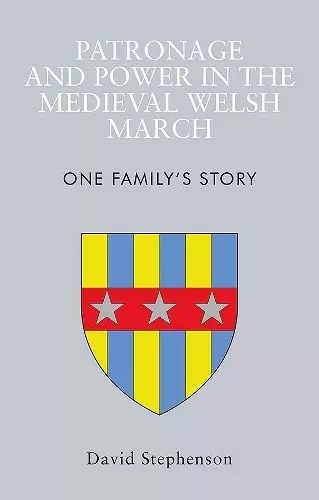Patronage and Power in the Medieval Welsh March
One Family's Story
Format:Paperback
Publisher:University of Wales Press
Published:15th Nov '21
Should be back in stock very soon

• It shows that lordship rather than ethnicity was often the key factor in political alignments. In the case of the family who are the focus of the book, the lords who offered patronage and advancement were ‘English’ – the Mortimers of Wigmore, lords of much of mid-Wales, and the de Bohun earls of Hereford and lords of Brecon. • It challenges the view that the 14th century was a period of oppression and suffering for Welsh people, in the aftermath of the ‘Edwardian Conquest’. For this family, as for many others, the 14th century was an age of prosperity and upward mobility. • In addition the book focuses on a family whose members represent a very early example of Anglicisation – a tendency to move into England, into English county governance and into the orbit of the English royal court. Again this shows that for some families their Welsh background was no barrier to advancement on the English side of the border. This was a more open society than many people assume. • In addition, the narrative is an exciting one: members of the family were involved in stirring developments: one was a leader of Welsh opposition to Llywelyn, prince of Wales; others were advisers to Edward II when his realm was threatened by invasion from Scotland and Ireland; but then they turned against the king, and one of them suffered imprisonment in the Tower of London, before Edward’s regime collapsed and the former prisoner led the hunt for the fleeing king in south Wales, which resulted in his capture and death. Later members of the family included marcher lords who held the lordship of Bronllys where their great castle can still be seen, and a literary figure who was a friend of Geoffrey Chaucer, who acted as a diplomat for Richard II and a crusader, dying near Constantinople. The later members of the family were accused of heresy, but survived; the last of them fought against Glyn Dŵr, was captured at Pilleth/Bryn Glas, but ransomed. In other words, at the heart of the book there are many good stories.
This book traces the remarkable and sometimes hazardous rise of a Welsh family of the Anglo-Welsh borderland, from relatively humble origins to becoming key players in the politics of thirteenth and fourteenth century Wales, as well as prominent advisers, diplomats and administrators for the English kings of the fourteenth century.This is the first full-length study of a Welsh family of the thirteenth to fifteenth centuries who were not drawn from the princely class. Though they were of obscure and modest origins, the patronage of great lords of the March - such as the Mortimers of Wigmore or the de Bohun earls of Hereford - helped them to become prominent in Wales and the March, and increasingly in England. They helped to bring down anyone opposed by their patrons - like Llywelyn, prince of Wales in the thirteenth century, or Edward II in the 1320s. In the process, they sometimes faced great danger but they contrived to prosper, and unusually for Welshmen one branch became Marcher lords themselves. Another was prominent in Welsh and English government, becoming diplomats and courtiers of English kings, and over some five generations many achieved knighthood. Their fascinating careers perhaps hint at a more open society than is sometimes envisaged.
ISBN: 9781786838186
Dimensions: unknown
Weight: unknown
160 pages